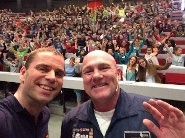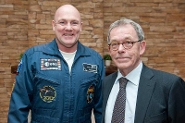
Astronaut André Kuipers touches down at Leiden University
In his guest lecture on 22 January André Kuipers took school pupils and students on trip through space. His mission was to interest his young listeners in science and technology.
Pop star
The whole lecture hall in the Gorlaeus building cheered as a broadly smiling Kuipers arrives. The space traveller and ambassador of Techniekpact was given a pop star welcome. 'Who wants to be an astronaur?' he asked. At least thirty eager children raised their hands.
How does gravity work?
Kuipers demonstrated the effect of gravity by throwing a tennis ball in the air. Along with science journalist Sander Koenen he presented some impressive figures: the rocket that André Kuipers had been in travelled at 28,000 kilometres an hour, 25 times faster than a plane. It has to be at such a high speed otherwise the rocket would fall back to the Earth.

Rucola - or rocket! - on board
Video clips show Kuipers entering the Soyuz rocket in late 2011. The audience could also see how he carried out his experiments on board and how such activities as taking a shower worked very differently in space. Kuipers also showed photos of the Netherlands and the Earth taken from space. In between, the audience could ask questions about the research he carried out on board. Kuipers gave examples of medical experiments and even living research material. One thing he tested was what happens when you water rucola - or rocket - seeds. Can plants grow without gravity? The answer: indeed they can, but not in the same way as on Earth. In space, they grow in all directions, rather than upwards.

3D printer
Kuipers talked about the importance of advanced technology, such as food technology and new printing techniques. During his space trip in 2011, the crew took enough food for a year with them: the food needed to be frozen or dried to the maximum degree possible to make sure that bacteria had no opportunity to spoil the food. So what happens if any of the equipment breaks? Kuipers did actually break a tube in a piece of equipment and at that time there was no way of replacing it. Today things are different: the equipment on board includes a 3D printer so that many components can be produced on the spot.
How do you go to the toilet?
The children were very curious about life on board. Sam wanted to know: Can you catch a cold in space? Indeed you can, Kuipers said. He had even had an ear infection, but fortunately there were ear drops in the medical kit. Sleeping is easy; you can do that floating, but going to the toilet takes some getting used to. First you switch on the vacuum cleaner and then a tube collects the urine. And then... the urine is converted into drinking water. This was greeted with loud cries of 'Yuck!' from the audience. And if you want to know more toilet facts: faeces go into a tank, and as soon as it's full, it's released into the Earth's atmosphere where it's incinerated.
Super cool
At the end of his lecture, Kuipers again stressed the importance of science and technology, and in particular how important it is to be curious. It's only through curiosity that discoveries are made. His message struck a chord judging by the enthusiastic comments from the children after the lecture. 'This is super cool,’ was the reaction of Paul from the Lucas van Leydenschool. He knows already what he wants to do later: 'I'm going to work with robots.'
Science Hub
After the lecture by André Kuipers and Sander Koenen, the school children followed a science and technology programme at the Science Hub in Leiden, organised by ICLON and the partners of the Marvel Passport. The aim of the programme is to let children and young people find out more about science.
